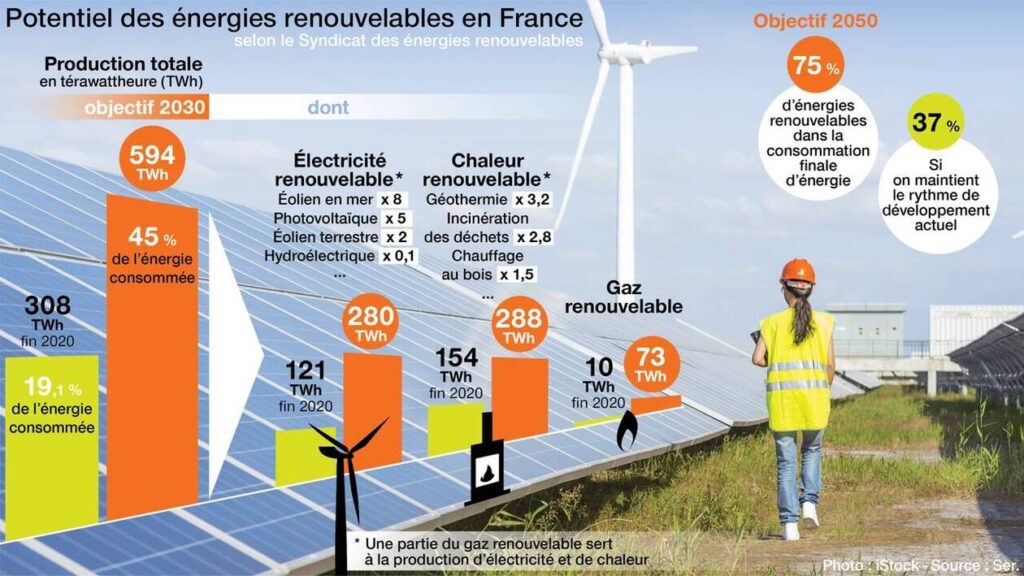In the face of rising environmental concerns, the German far right, led by the AfD party, has found fertile ground to mobilize its electorate. Taking advantage of economic uncertainties and fears related to the energy transition, this movement seeks to achieve its first electoral victories by targeting renewable energy policies. By capitalizing on local anxieties and promising a return to traditional energy sources, the AfD hopes to attract a public increasingly skeptical of the costs and rapid changes imposed by the ecological transition.

As Germany experiences an intense electoral period, the far right, notably the Alternative for Germany (AfD), is turning to energy issues to gain popularity. By attacking renewable energies, these parties seek to collect votes from voters concerned about the country’s energy and economic transformations.
The AfD’s Electoral Strategy
The Alternative for Germany (AfD) has decided to target pro-renewable energy policies as the central axis of its campaign. By denouncing what they call the “green lobby,” they aim to attract part of the population worried about rising energy costs and the economic impacts of climate policies. Their arguments focus on rejecting subsidies for green energies and calling for a return to nuclear and fossil fuels.
Economic Victims and Energy Insecurity
The AfD particularly addresses workers from traditional sectors and residents of industrial regions, severely affected by the energy transition. By playing on economic fears and energy insecurity, the far right manages to gather a broad electoral base, ranging from blue-collar workers to retirees, including small and medium-sized enterprises. They highlight the rising electricity prices and potential job losses in traditional industries as arguments against renewable energies.
Mobilization Against Renewable Energies
The far right organizes protests and public meetings to raise voter awareness of their cause. These events aim not only to criticize the track record of previous governments in energy matters, but also to denounce projects for wind turbines and solar panels as harmful to the local environment and the well-being of citizens. By promoting a conservative and protectionist vision of the economy, they seek to establish a direct link between national identity and energy sovereignty.
The AfD’s Initial Electoral Successes
This strategy is starting to bear fruit. The AfD recently won several local electoral victories, particularly in the municipal elections in Pirna, marking a historic first for the party. These successes are a direct result of their anti-renewable energy campaign. With each election, they consolidate their position by exploiting local discontent and promising an energy policy more focused on the immediate needs of citizens, rather than long-term climate goals.
The Impact on the German Political Landscape
With the rise of the far right, the German political landscape is profoundly transformed. Traditional parties, such as the CDU and SPD, are forced to reconsider their positions and strategies in order to contain this populist wave. The increasing polarization surrounding energy issues poses major challenges to social cohesion and the advancement of environmental policies in Germany.
Challenges for the Energy Transition
As Germany aspires to be a global leader in energy transitions, the robust opposition from the AfD could slow these efforts. The renewal of infrastructures and the demand for green innovation now encounter stronger political contestation than ever. It is urgent for renewable energy advocates to rally broader public support to counter this negative narrative propagated by the far right.
The battle for Germany’s energy future is now also a political battle. The far right has succeeded in instrumentalizing this issue to achieve its early electoral successes, playing on economic fears and societal uncertainties. The outcome of this struggle will have profound implications not only for German domestic politics but also for global efforts to combat climate change.
Le barrage à l'extrême droite "a été très solide à gauche et assez solide au centre" ? @le_Parisien
— Nicolas Berrod (@nicolasberrod) July 7, 2024
Duel Ensemble/RN
• 72 % des électeurs NFP ont voté Ensemble
• 53 % des électeurs LR ont Ensemble
Duel LFI/RN
• 43 % des électeurs Ensemble ont voté LFI
• 26 % des… pic.twitter.com/BoKs1JfhJz
Articles similaires
Thank you!
We will contact you soon.














